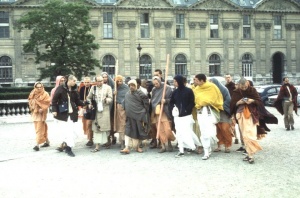SB 11.2.28: Difference between revisions
No edit summary |
(Vanibot #0054 edit - transform synonyms into clickable links, which search similar occurrences) |
||
| Line 24: | Line 24: | ||
<div class="synonyms"> | <div class="synonyms"> | ||
śrī-videhaḥ | ''[//vanipedia.org/wiki/Special:VaniSearch?s=śrī&tab=syno_o&ds=1 śrī]-[//vanipedia.org/wiki/Special:VaniSearch?s=videhaḥ&tab=syno_o&ds=1 videhaḥ] [//vanipedia.org/wiki/Special:VaniSearch?s=uvāca&tab=syno_o&ds=1 uvāca]'' — King Videha said; ''[//vanipedia.org/wiki/Special:VaniSearch?s=manye&tab=syno_o&ds=1 manye]'' — I consider; ''[//vanipedia.org/wiki/Special:VaniSearch?s=bhagavataḥ&tab=syno_o&ds=1 bhagavataḥ]'' — of the Supreme Lord; ''[//vanipedia.org/wiki/Special:VaniSearch?s=sākṣāt&tab=syno_o&ds=1 sākṣāt]'' — directly; ''[//vanipedia.org/wiki/Special:VaniSearch?s=pārṣadān&tab=syno_o&ds=1 pārṣadān]'' — personal associates; ''[//vanipedia.org/wiki/Special:VaniSearch?s=vaḥ&tab=syno_o&ds=1 vaḥ]'' — you; ''[//vanipedia.org/wiki/Special:VaniSearch?s=madhu&tab=syno_o&ds=1 madhu]-[//vanipedia.org/wiki/Special:VaniSearch?s=dviṣaḥ&tab=syno_o&ds=1 dviṣaḥ]'' — of the enemy of Madhu; ''[//vanipedia.org/wiki/Special:VaniSearch?s=visṇoḥ&tab=syno_o&ds=1 visṇoḥ]'' — of Lord Viṣṇu; ''[//vanipedia.org/wiki/Special:VaniSearch?s=bhūtāni&tab=syno_o&ds=1 bhūtāni]'' — the servants; ''[//vanipedia.org/wiki/Special:VaniSearch?s=lokānām&tab=syno_o&ds=1 lokānām]'' — of all the worlds; ''[//vanipedia.org/wiki/Special:VaniSearch?s=pāvanāya&tab=syno_o&ds=1 pāvanāya]'' — for the purification; ''[//vanipedia.org/wiki/Special:VaniSearch?s=caranti&tab=syno_o&ds=1 caranti]'' — they move about; ''[//vanipedia.org/wiki/Special:VaniSearch?s=hi&tab=syno_o&ds=1 hi]'' — indeed. | ||
</div> | </div> | ||
Latest revision as of 20:29, 17 February 2024

A.C. Bhaktivedanta Swami Prabhupada
Please note: The synonyms, translation and purport of this verse were composed by disciples of Śrīla Prabhupāda
TEXT 28
- śrī-videha uvāca
- manye bhagavataḥ sākṣāt
- pārṣadān vo madhu-dvisaḥ
- viṣṇor bhūtāni lokānāṁ
- pāvanāya caranti hi
SYNONYMS
śrī-videhaḥ uvāca — King Videha said; manye — I consider; bhagavataḥ — of the Supreme Lord; sākṣāt — directly; pārṣadān — personal associates; vaḥ — you; madhu-dviṣaḥ — of the enemy of Madhu; visṇoḥ — of Lord Viṣṇu; bhūtāni — the servants; lokānām — of all the worlds; pāvanāya — for the purification; caranti — they move about; hi — indeed.
Translation and purport composed by disciples of Śrīla Prabhupāda
TRANSLATION
King Videha said: I think that you must be direct associates of the Supreme Personality of Godhead, who is famous as the enemy of the demon Madhu. Indeed, the pure devotees of Lord Viṣṇu wander throughout the universe not for their personal, selfish interest, but to purify all the conditioned souls.
PURPORT
King Nimi here welcomes the great sages by glorifying their transcendental activities. It is well known that the Supreme Personality of Godhead is transcendental to the three modes of material nature, as stated in Bhagavad-gītā (BG 7.13): mām ebhyaḥ param avyayam. Similarly, His pure devotees are also on the transcendental platform. One may ask how such transcendental living beings as the associates of Lord Viṣṇu could be seen within the material world. Therefore it is stated here, pāvanāya caranti hi: the associates of Lord Viṣṇu travel throughout the universe to reclaim the fallen, conditioned souls on behalf of the Supreme Personality of Godhead. A representative of the governor may be seen moving within the prison house, but that does not mean that the governor's representative has become a conditioned prisoner. It is understood that he is within the prison to negotiate the possible release of those prisoners who have rectified their criminal propensity. Similarly, the devotees of the Supreme Personality of Godhead called parivrājakācāryas wander throughout the universe inviting everyone to surrender to Lord Kṛṣṇa and go back home, back to Godhead, for an eternal life of bliss and knowledge.
In the Sixth Canto of Śrīmad-Bhāgavatam the mercy of the associates of Lord Viṣṇu has been described in connection with the salvation of Ajāmila. Śrīla Bhaktisiddhānta Sarasvatī Ṭhākura has pointed out that the associates of Lord Viṣṇu are as merciful as the Lord Himself. Even though the ignorant members of human society are not interested in approaching the servants of Lord Viṣṇu, the devotees of the Lord, without any false prestige, act to liberate the conditioned souls from their perpetual misfortune.